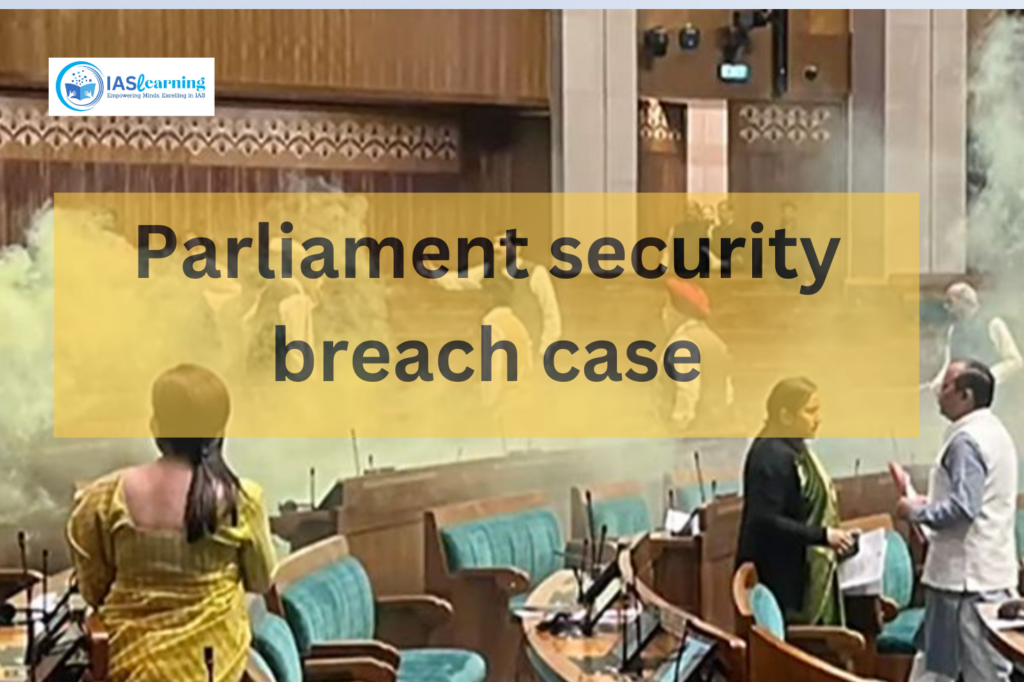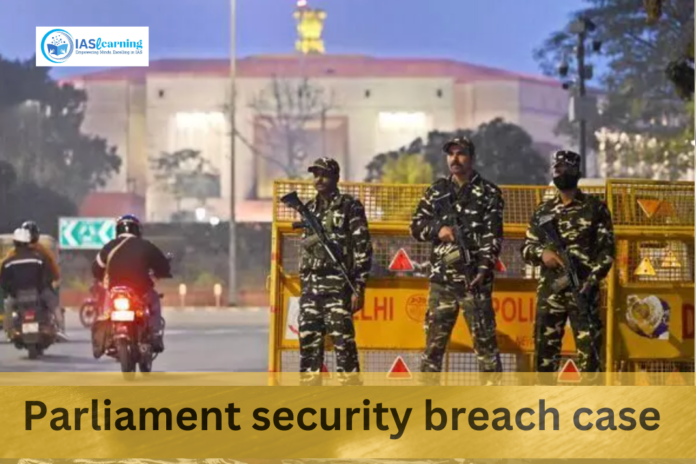Context
A recent Security Breach in Parliament occurred in the Lok Sabha after leaders paid homage to the security personnel who lost their lives in the 2001 Parliament attack.
On Wednesday, December 13, two young men, Sagar Sharma and Manoranjan D, entered the Lok Sabha gallery, where they shouted anti-establishment slogans and released yellow smoke from canisters. MPs and security quickly subdued them. Meanwhile, outside the House, Neelam Azad and Amol Shinde also released yellow smoke, which was found to be harmless. The individuals responsible for this criminal and misguided attempt to disrupt proceedings have been arrested, and it is likely that they will face prosecution to the full extent of the law.
What is particularly alarming about the events on December 13 is the apparent lapse, a significant failure, in Parliament security and the intelligence apparatus. The ease with which the new building was breached, especially on the anniversary of the 2001 terrorist attack, raises disturbing possibilities of what could have transpired.
- The Delhi Police have applied sections of the Unlawful Activities (Prevention) Act, an anti-terror law, against the accused.
- Additionally, they have invoked sections of the Indian Penal Code (IPC) related to criminal conspiracy, trespass, provoking a riot, and obstructing a public servant in the discharge of functions. The individuals involved were found carrying visitors’ passes issued to them during the 2001 attack.

Rules of Parliament Visitors
- The regulations governing the admission and conduct of visitors (referred to as “strangers” in parliamentary terminology) during Lok Sabha sessions are outlined in Rule 386 of the Rules of Procedure and Conduct of Business. This rule covers the procedures for the admission, withdrawal, and removal of visitors.
- Rule 387 confers the authority upon the Speaker to remove “strangers” from any section of the House if it is deemed necessary. The Speaker holds the discretion to exercise this power based on the circumstances.
- In addition, Rule 387A, which is sanctioned by the Speaker, delegates the authority to a Secretariat officer to remove or take into custody any stranger within the House precincts that are designated for members. This provision applies to strangers who engage in misconduct, violate regulations set by the Speaker (as per Rule 386), or fail to withdraw when instructed to do so under Rule 387 during the proceedings of the House.
- Members of Parliament can request visitors’ cards only for individuals personally known to them. To facilitate this, a certification process is in place where members must provide a statement vouching for the personal acquaintance with the visitor. The certification should specify the nature of the relationship, such as being a relative, personal friend, or someone known to the member, and the member takes full responsibility for the visitor.
- These visitors’ cards, which allow admission to the visitors’ galleries, are typically issued for a single sitting, usually lasting around one hour. Importantly, these cards are non-transferable, and their issuance is contingent upon the cardholder adhering to the specified conditions.
- For security purposes, visitors are required to carry photo identification along with the certification when entering. Similar regulations apply to visitor entry into the Rajya Sabha.
- Members are strongly advised to exercise caution, particularly when facilitating the entry of individuals introduced by someone personally known to them. Members bear full responsibility for any untoward incidents or undesirable activities in the galleries that may arise from the actions of the cardholders.
The 2001 attack on the Indian Parliament occurred on December 13, 2001, when a group of armed militants attacked the Parliament in New Delhi. The attackers were associated with the Pakistan-based militant organizations Lashkar-e-Taiba and Jaish-e-Mohammed. The attack led to the loss of lives among security personnel and government officials. It highlighted the susceptibility of India's parliamentary democracy to external threats and prompted a significant revamping of its security arrangements.
It is crucial, amidst discussions about its security, to also reflect on the significance of Parliament. Following the attack, Defence Minister Rajnath Singh urged all MPs to be vigilant and cautious when issuing passes. He advised Opposition members not to incite anarchy, emphasizing that the Lok Sabha Speaker and the government were already conducting inquiries. There may be some validity in his advice. The wrongdoers had indeed obtained visitor passes through an MP.
However, safeguarding the House should not compromise its accessibility. Parliament represents both the people and is meant for the people, a principle that has held throughout independent India's history. While ensuring the security of the House is paramount, it should not undermine its openness.
The suspension of 14 Opposition MPs for demanding, albeit in a noisy and possibly unruly manner, that the Home Minister address the security breach, warrants reconsideration. Just as the building symbolizes Indian democracy and must be secure, the elected representatives who serve as its voice must also be protected.



